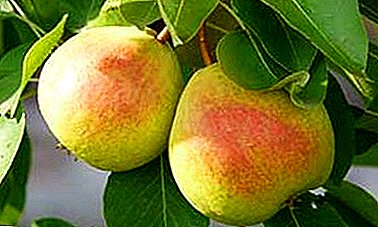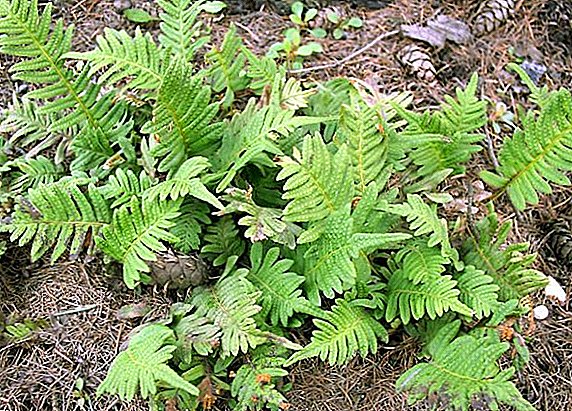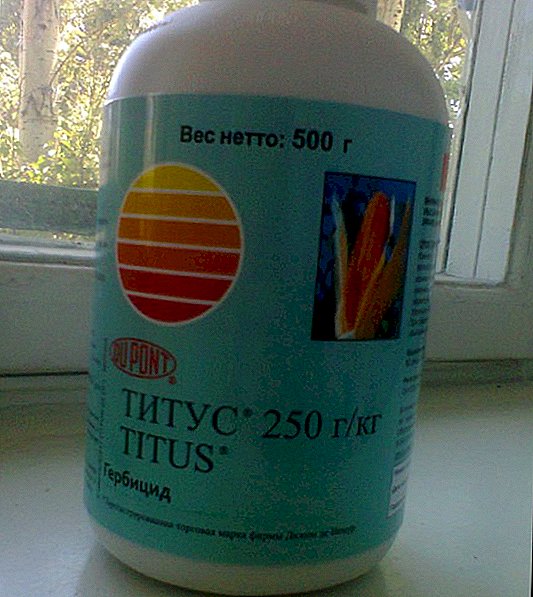 Every year with the arrival of the planting season, the topic of herbicides again and again gains relevance. Successful weed control is a pledge of a rich and high-quality harvest.
Every year with the arrival of the planting season, the topic of herbicides again and again gains relevance. Successful weed control is a pledge of a rich and high-quality harvest.
In this article we will look at the features of the highly effective post-emergent herbicide "Titus", its scope of application, instructions for preparing the working mixture, and safety measures during processing.
What is the drug "Titus"
"Titus" - a chemical drug that is used to control a number of weeds. It belongs to the group of systemic post-harvest herbicides of selective action. Sold in the form of water-soluble granules, packaged in containers of 0.5 kg.
Another way to control weeds in the garden is to plow the land with a cultivator, motoblock or tractor."Titus" is intended for use on such cultures:
- corn;
- potatoes;
- tomatoes
 The drug during its use has demonstrated high efficiency in the fight against distressed annuals and perennial weeds:
The drug during its use has demonstrated high efficiency in the fight against distressed annuals and perennial weeds: - wheatgrass creeping;
- chaff;
- ragweed;
- nightshade;
- bristle;
- bullberry;
- purslane;
- a hand;
- amaranth;
- buttercup;
- shepherd's purse;
- smokyka;
- field mint;
- chamomile;
- wild poppy;
- millet.
 In the preparation "Titus", the active ingredient is rimsulfuron (250 g of the active ingredient per 1 kg of the herbicide).
In the preparation "Titus", the active ingredient is rimsulfuron (250 g of the active ingredient per 1 kg of the herbicide).Did you know? Sow thistle, wheatgrass and purslane are leaders in survivability and difficulty removing. The roots of these weeds can reach a length of 4 meters, and a new plant will soon grow from a two-three-centimeter root that remains in the ground.
The mechanism of action of the herbicide
 "Titus" is absorbed by the foliage and spreads very quickly throughout the plant. Penetrating into weeds that are sensitive to the drug, it blocks the synthesis of vital amino acids (valine, isoleucine), stops the division and growth of plant cells. Weed growth stops already a day after treatment, and The first visible signs of a lesion appear approximately on the fifth day:
"Titus" is absorbed by the foliage and spreads very quickly throughout the plant. Penetrating into weeds that are sensitive to the drug, it blocks the synthesis of vital amino acids (valine, isoleucine), stops the division and growth of plant cells. Weed growth stops already a day after treatment, and The first visible signs of a lesion appear approximately on the fifth day:
- yellowing and twisting of the leaves;
- twisting stems;
- necrotic spots on plants;
- weed drying.
Important! With very strong pollution, it is recommended to use "Titus" in a mixture with "Surfactant Trend 90" (200ml / ha), which increases the effectiveness of the herbicide on weeds.
The advantages of this herbicide
The preparation against weeds "Titus" has the following advantages: 
- penetrates the plant quickly (over three hours) and immediately begins its impact - three hours after treatment, precipitation is no longer terrible;
- a wide range of vulnerable weeds;
- effective in combating the most difficult "enemies" of agricultural crops;
- economical in consumption;
- replaces the pre-seed, pre-emergence treatment programs;
- equally effective on wet and dry soils;
- flexible usage pattern;
- great for making baxses;
- the half-life in earth is about 10 days;
- does not harm the soil;
- not phytotoxic, does not harm protected plants;
- convenient in transportation and storage;
- relatively safe for animals, humans, bees.
Instructions for the preparation and application of the solution
"Titus" is a post-harvest herbicide, and, according to the instructions for use, the treatment is carried out at the stage of formation of 2-4 true leaves in annual weeds, when reaching 10-15 cm perennial plants and in the period of rosette formation with regards to sowwood. Sowing tomatoes are sprayed in the phase of the formation of three leaves, sprouts - twenty days after planting in the ground. Processing is usually carried out once a season. however, with significant debris, repeated spraying is allowed after 10–20 days. If necessary, re-processing of potatoes and corn, the rate of consumption of "Titus" is divided in half, for tomatoes it remains the same.
Did you know? There are cases when herbicides have been actively used not only in order to control weeds, but also in military strategy. For example, the United States used Agent Orange during the Vietnam War.
Pellets means diluted in water. First, half of the sprayer is filled with water, then the required amount of herbicide is added there and mixed well. Without ceasing to interfere, the rest of the water is poured into the tank. Consumption of the prepared solution - 200-250 liters per hectare. Processing needs to be carried out only by fresh mix.
"Titus" for the treatment of corn is used in such standards: 40 g per hectare when removing annual weeds, 50 g with mixed annual and perennial vegetation, 60 g with significant contamination. With double treatment for the first time make 30 g, the second - 20 g.
For processing tomatoes use 50 g of product per hectare. If necessary, re-spraying rate is the same.
 "Titus" for spraying on potatoes is used in such quantities: 50 g per hectare. Sprayed after hilling culture. In the case of double treatment at the first spraying, the herbicide for potatoes is used in the amount of 30 g, at the second treatment - 20 g.
"Titus" for spraying on potatoes is used in such quantities: 50 g per hectare. Sprayed after hilling culture. In the case of double treatment at the first spraying, the herbicide for potatoes is used in the amount of 30 g, at the second treatment - 20 g.
Means is not subject to application on plants, wet from dew or a rain. Do not carry out manual weeding and mechanical work on the treated area for two weeks after spraying.
Safety measures at work
"Titus", according to the description, refers to the preparations of the third class of danger (low hazard) for bees and people. When working with a herbicide, you must adhere to these rules: 
- do not use food containers for the preparation of the mixture;
- Protect all parts of the body with clothes, face - with a mask or gauze bandage and goggles, cover the hair with a hat;
- do not eat or drink when working with the herbicide;
- do not taste the solution or inhale its vapors;
- after work, thoroughly wash the container, wash your hands with soap, drink half a liter of water;
- safe distance from bee hives - 3-4 km;
- Do not allow pets to the site during spraying and a few more days after.
Important! "Titus "irritates the eyes and nose, they must be protected when working with the drug.
Storage conditions
 Herbicide can be stored no more than three years in a sealed production packaging.
Herbicide can be stored no more than three years in a sealed production packaging.
Store the drug in a dry dark place, out of reach of children, at a temperature of from +10 to + 25 ° C.
With proper use and compliance with all safety measures, "Titus" will be your faithful and effective helper in weed control.












